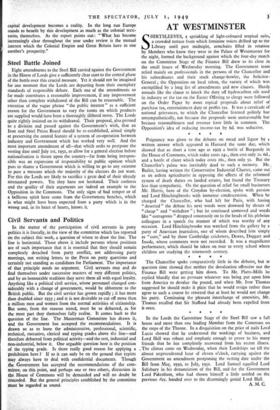AT WESTMINSTER
SHIRTSLEEVES, a sprinkling of light-coloured tropical suits,' a crowded terrace from which feminine voices drifted up to the Library until past midnight, armchairs filled in rotation by Members who knew they were in the Palace of Westminster for the night, formed the background against which the four-day match on the Committee Stage of the Finance Bill drew to its close in the small hours of Wednesday morning. The Government team relied mainly on professionals in the persons of the Chancellor and his subordinates and their stock change-bowler, the Solicitor- General ; the Opposition on local talent, the variety of which was exemplified by a long list of amendments and new clauses. Hardy annuals like the clause to knock the duty off hydrocarbon oils used in industry or the tax on the Easter Offering to clergy were followed on the Order Paper by more topical proposals about relief of purchase tax, entertainment duty or profits tax. It was a cavalcade of national grievances, to which the Chancellor listened politely but unsympathetically, not because the proposals were unreasonable but because reasonableness and revenue have little in common. The Opposition's idea of reducing income-tax by 6d. was seductive.
* * * *
Poignancy was given to the debates on mead and liquor by a written answer which appeared in Hansard the same day, which showed that as short a time ago as 1929 a bottle of Burgundy in the House of Commons, which today costs 24s., then cost only 2s. 6d., and a bottle of claret which today costs 26s., then only 5s. But the Chancellor's palate was inevitably dead to such a memory. Mr., Butler, having written the Conservative Industrial Charter, came out as an ardent agriculturist in opposing the effects of the reformed system of death duties on landed estates, but found the Treasury less than sympathetic. On the question of relief for small businesses Mr. Harris, hero of the Croydon by-election, spoke with passion and Lord Hinchingbrooke with immense condescension. When he charged the Chancellor, who had left for Paris, with having " deserted " the debate his next words were drowned by shouts of "cheap " and " withdraw " ; but he continued unmoved and words like " outrageous " dropped sonorously on to the heads of his plebeian colleagues in a speech the manner of which was worthy of any occasion. Lord Hinchingbrooke was watched from the gallery by a party of American journalists, one of whom described him simply as "cute," and by three Cambridge cricketers, Dcwes, Doggart and Insole, whose comments were not recorded. It was a magnificent performance, which should be taken on tour to every school where children are studying the nineteenth century.
* * * * The Chancellor spoke comparatively little in the debates, but at question time showed that neither the devaluation offensive nor the Finance Bill were getting him down. To Mr. Platts-Mills he replied blandly that no pressure whatever was being put upon him from America to devalue the pound, and when Mr. Ivor Thomas suggested he should make it plain that he would resign rather than agree to such a course he retorted that at least he would not change his party. Continuing the pleasant interchange of amenities, Mr. Thomas recalled that Sir Stafford had already been expelled from it once.
* * * *
In the Lords the Committee Stage of the Steel Bill saw a full house and more than one leading Member from the Commons on the steps of the Throne. In a disquisition on the price of nails Lord Lucas showed that he understood the workings of business, and Lord Hall was robust and emphatic enough to prove to his many friends that he has completely recovered from his recent illness. , The climax came on Wednesday, when their Lordships sat till the almost unprecedented hour of eleven o'clock, carrying against the Government an amendment postponing the vesting date under the Bill from May, 1950, to July, 1951. Lord Samuel equalled Lord Salisbury in his denunciation of the Bill, and for the Government Lord Pakcnham, who had shown himself a little nettled on the previous day, handed over to the disarmingly genial Lord Hall. A. M. C.






































 Previous page
Previous page